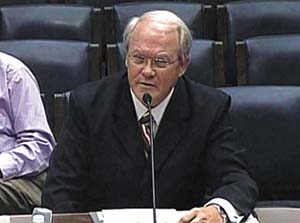Extending marriage-like benefits to same-sex couples will give such unions an elite status and will promote a social agenda largely opposed by evangelical Christians, a former Southern Baptist Convention president told members of Congress.
 Frank Page testifies before Congress.
Frank Page testifies before Congress.Testifying July 8 with seven other witnesses before a House of Representatives subcommittee, Frank Page, pastor of Taylors First Baptist Church and SBC president from 2006-08, was the only one who opposed a bill to extend benefits now reserved for the spouses of federal employees to the same-sex, domestic partners of such workers. Among the benefits the Domestic Partnership Benefits and Obligations Act would bestow on homosexual partners of federal employees are health insurance, retirement and disability benefits, group life insurance, and family and medical leave.
“I do believe that it has been the perennial role of the government to support the institutions of society, such as marriage,” Page said before the Subcommittee on Federal Workforce, Postal Service and the District of Columbia. “[This bill] is taking a direct role in opposition to a traditional definition and support of that which marriage has traditionally been – .
“The government should be in the process of encouraging the traditional marriage that has stood for many, many hundreds of years as that way that culture is best protected,” Page said, adding that “government ought to be encouraging, not discouraging, [marriage]. And I think this act discourages.”
Page said he believes in “moral absolutes.”
“Those are words we have not heard today,” Page said. “Those are words that are not popular in our culture today.
“We also, as unpopular as it is today, believe that this is a part of a social agenda that continues to seek normalization of a homosexual lifestyle that I and, I believe, many other evangelicals, not all, certainly oppose,” Page said. “We care for people. We do love people, but we’re painted as if we are hateful, caricatured as mean-spirited. We’re not. But we do believe there are absolutes, and we stand by them.”
Page said he opposes the bill for financial reasons, as well as moral ones.
In written testimony submitted before the hearing, he expressed concern about the possibility of widespread fraud and waste. “I do believe that this creates an opportunity for abuse,” Page told Rep. Stephen Lynch, D.-Mass., the subcommittee chairman and the lone member in attendance when Page testified. – BP